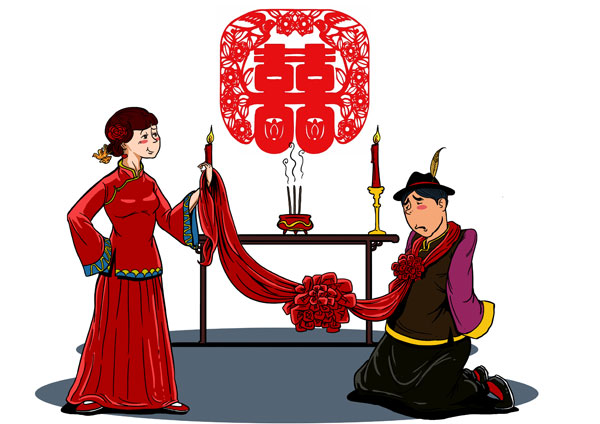Live-in sons-in-law struggle to fit in
 0 Comment(s)
0 Comment(s) Print
Print E-mail China Daily, March 3, 2016
E-mail China Daily, March 3, 2016

After 10 years as a necessary, but ultimately unwelcome, live-in son-in-law, Ma Xuedong divorced, and moved out of his wife's family home.
The end of his unhappy marriage pleased the 37-year-old migrant construction worker, even though he had to scramble to find a place to live in Baoji, Shaanxi province.
"My previous life was too depressing," Ma said. "It's a feeling you will never be able to understand if you have not experienced it."
Ma speaks for many of China's so-called live-in sons-in-law, who marry and move in with their wives' families, but never quite became an integral part of the family.
Their numbers are legion, a result of China's decades-old gender imbalance, a historic preference for male offspring, enduring marriage customs and the desire of families to preserve a surname in danger of dying out in a household in which all of the children are girls.
In a traditional view of marriage in China, a woman marries a man and lives with his family, or the couple lives in their own house, bought by the husband's family, and their children take the husband's surname.
This custom has been upended in two ways. First, China's gender imbalance means many men, especially in rural areas, have trouble finding wives. By the end of 2015, on the Chinese mainland, men outnumbered women by 33.66 million, making it challenging for China's left-over men to find a partner.
Second, a poor man who cannot pay an expected "bride price" may look for a family that will pick up the cost. These men may marry a woman with no brothers, move into the woman's family home and allow their children to carry their mother's surname.
Even though the arrangement meets the needs of all involved, families and communities still look down on those who have no sons and opt for live-in sons-in-law to fill the void. In many cases, the resentment creates unhappiness.
Ma said he felt free after he signed his divorce agreement, although he left without any property. "They still considered me a poor guy from a remote mountain area," Ma said.
Ma was born in Mabaozi village in Baoji, where many young men face a future as a live-in son-in-law because it is the only way for them to marry. Nearly 80 percent of the adult men in the village became live-in sons-in-law because no women want to move to a poor, backward village, said Li Zhijun, director of Mabaozi's villagers' committee.
"In recent years, the bride price, money paid by bridegroom's family to the bride's family, increased to about 100,000 yuan ($151,990) from 30,000 to 50,000 yuan, but no women wanted to marry into our poverty-stricken village," Li said.
Two tragedies have highlighted the challenges live-in sons-in-law face. Earlier this year, a live-in son-in-law, surnamed Meng, in Weinan, Shaanxi province, killed his wife. He reportedly had been depressed with his circumstances since he married in 2013. Two years ago, on Nov 22, 2013, a live-in son-in-law in Huaiyang county, Henan province, killed seven members of his wife's family, including his wife and 10-year-old son.
The unhappiness is not universal. Many live-in sons-in-law live happy, hardworking lives with good communication and affection from their wives and extended families.
Lyu Xiaoping, 36, who works in the security department of a company in Xi'an, the capital of Shaanxi province, also hails from Mabaozi. He married his wife, surnamed Yang, in 2008 and agreed to let their child carry his wife's surname.
"My wife and I love each other very much and she takes my feelings into account as she gave our child the name Yang Lyujiang, which includes my surname," Lyu said.
Zhang Baotong, a social and economic development expert with the Shaanxi Provincial Academy of Social Sciences, said live-in sons-in-law should learn to get along with their wives' families and people in their communities.
Additionally, Zhang said, the genders are equal in modern society, and couples can choose their marriage styles with their own conditions.
"With the development of urbanization, more and more poor farmers will work and live in urban areas and some of them may become live-in sons-in-law as they cannot pay for houses and the other costs of marriage," Zhang said.
"And our marriage concept should change with the development of the times to give full respect to the sons-in-law."






Go to Forum >>0 Comment(s)